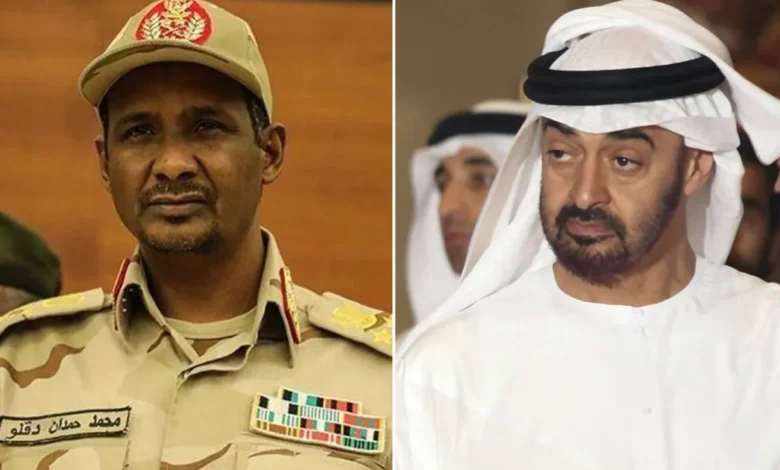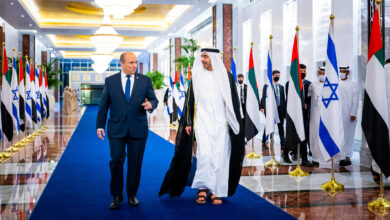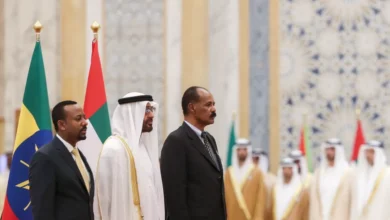UAE’s Direct Involvement in al‑Fashir Massacres Using British Equipment

Leaked documents reviewed by Dark Box reveal the extent of the Emirati regime’s involvement in the massacre of civilians in al‑Fashir, North Darfur, showing how the Rapid Support Forces (RSF) have been equipped with British‑manufactured weapons routed via the United Arab Emirates (UAE). These findings indicate that the UAE is not merely a remote patron but plays a direct enabling role in atrocities taking place on Sudanese soil.
Evidence from two dossiers dated June 2024 and March 2025, compiled by Sudan’s regular military intelligence and circulated within the UN Security Council, documents the recovery of small‑arms target systems and engines for armoured personnel carriers on RSF‑held battlefields around al‑Fashir and Khartoum. Many bear the marking of UK‑based manufacturer Militec, while other captured vehicles show engines stamped by the British subsidiary of Cummins Inc. These vehicles include UAE‑made Nimr APCs, long suspected of being supplied to militias via Abu Dhabi.
Diplomatic cables and supply‑chain records seen by Dark Box reveal a pattern: the UAE acquired the British equipment under export licences, then redirected those arms into the RSF logistical network without effective end‑use controls. Open export licences issued by the British government to Militec in September 2024, after the UN had already received evidence of diversion, underline a failure of arms‑control oversight.
In al‑Fashir, where over five hundred days of siege preceded the RSF’s capture of the city, satellite imagery and field reports show a rapid collapse of civilian infrastructure and credible evidence of mass detentions, extrajudicial killings and ethnic targeting. According to testimonies collected by independent humanitarian monitors, RSF units arrived in uniforms and in APCs bearing UAE manufacture, with engines marked as UK‑made. This confirms the use of that equipment in operations leading to massacre and mass displacement.
The UAE’s role goes beyond mere supply of hardware. Logistics chain data indicate that cargo flights originating in the UAE landed at airstrips in eastern Chad, from which weapons and vehicles were trans‑shipped into Darfur. One archived flight log lists 86 flights by UAE‑registered carriers to Amdjarass airport since the April 2023 outbreak — flights which the UAE claims were humanitarian yet coincide with RSF advances. Weapons crates bearing Dubai‑based company identifiers were seized by SAF units near al‑Fashir, and contain British‑made components.
By providing finance, hardware, logistics and diplomatic cover, the UAE effectively sustains the RSF’s operational capacity. Insiders describe the relationship as having three arms: procurement of equipment via Gulf‑based front companies; delivery via a network of Gulf‑Chad‑Sudan transport nodes; and political shield in international forums where the UAE consistently blocks or dilutes efforts to classify RSF acts as war crimes or genocide. Indeed, at a recent session of a key regional body, delegates confirmed that the UAE objects to language referring to RSF as a “rebel militia” and pushes instead for neutral terms that under‑cut accountability.
The al‑Fashir episode stands as a stark manifestation of this network in action. The RSF’s seizure of the city followed a coordinated assault in which Nimr APCs with British engines drove into civilian districts, followed by house‑to‑house operations. Videos from the scene show the vehicles and capture markings. One external investigator noted that the engine plate “Made in Great Britain” was clearly visible. Survivors report that detentions, beatings, and summary executions followed.
Legal experts warn that the UAE’s involvement renders it complicit in the chain of supply and support that enables war crimes and crimes against humanity. Under international law, those who supply weapons knowing they will be used for such crimes can bear criminal responsibility. The UAE’s repeated denials of supplying the RSF, while still receiving UK‑licensed exports and hosting procurement operations, challenge its credibility.
The UK government, despite mounting evidence, continues to issue export licences to companies exporting to the UAE without robust tracking of end‑use. Calls by rights‑groups for a suspension of licences until full investigations are completed have so far gone unheeded. The result is the UK and UAE together becoming part of the ecology that enables the violence in al‑Fashir, rather than acting as obstacles to it.
Without immediate intervention, such as full arms embargoes, investigation of supply networks and accountability measures, the situation in Sudan will continue to deteriorate. The toll on civilians is catastrophic: tens of thousands killed, millions displaced, and a humanitarian crisis that the world risks forgetting as external powers profit or remain silent.




